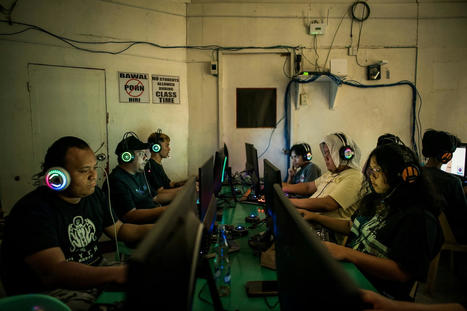By Rebecca Tan and Regine Cabato
CAGAYAN DE ORO, Philippines — In a coastal city in the southern Philippines, thousands of young workers log online every day to support the booming business of artificial intelligence.
In dingy internet cafes, jampacked office spaces or at home, they annotate the masses of data that American companies need to train their artificial intelligence models. The workers differentiate pedestrians from palm trees in videos used to develop the algorithms for automated driving; they label images so AI can generate representations of politicians and celebrities; they edit chunks of text to ensure language models like ChatGPT don’t churn out gibberish.
More than 2 million people in the Philippines perform this type of “crowdwork,” according to informal government estimates, as part of AI’s vast underbelly. While AI is often thought of as human-free machine learning, the technology actually relies on the labor-intensive efforts of a workforce spread across much of the Global South and often subject to exploitation.
The mathematical models underpinning AI tools get smarter by analyzing large data sets, which need to be accurate, precise and legible to be useful. Low-quality data yields low-quality AI. So click by click, a largely unregulated army of humans is transforming the raw data into AI feedstock.
In the Philippines, one of the world’s biggest destinations for outsourced digital work, former employees say that at least 10,000 of these workers do this labor on a platform called Remotasks, which is owned by the $7 billion San Francisco start-up Scale AI.
Scale AI has paid workers at extremely low rates, routinely delayed or withheld payments and provided few channels for workers to seek recourse, according to interviews with workers, internal company messages and payment records, and financial statements. Rights groups and labor researchers say Scale AI is among a number of American AI companies that have not abided by basic labor standards for their workers abroad.
Of 36 current and former freelance workers interviewed, all but two said they’ve had payments from the platform delayed, reduced or canceled after completing tasks. The workers, known as “taskers,” said they often earn far below the minimum wage — which in the Philippines ranges from $6 to $10 a day depending on region — though at times they do make more than the minimum.
Scale AI, which does work for firms like Meta, Microsoft and generative AI companies like Open AI, the creator of ChatGPT, says on its website that it is “proud to pay rates at a living wage.” In a statement, Anna Franko, a Scale AI spokesperson, said the pay system on Remotasks “is continually improving” based on worker feedback and that “delays or interruptions to payments are exceedingly rare.”
But on an internal messaging platform for Remotasks, which The Washington Post accessed in July, notices of late or missing payments from supervisors were commonplace. On some projects, there were multiple notices in a single month. Sometimes, supervisors told workers payments were withheld because work was inaccurate or late. Other times, supervisors gave no explanation. Attempts to track down lost payments often went nowhere, workers said — or worse, led to their accounts being deactivated.
Charisse, 23, said she spent four hours on a task that was meant to earn her $2, and Remotasks paid her 30 cents.
Jackie, 26, said he worked three days on a project that he thought would earn him $50, and he got $12.
Benz, 36, said he’d racked up more than $150 in payments when he was suddenly booted from the platform. He never got the money, he said.
Paul, 25, said he’s lost count of how much money he’s been owed over three years of working on Remotasks. Like other current Remotasks freelancers, Paul spoke on the condition of being identified only by first name to avoid being expelled from the platform. He started “tasking” full time in 2020 after graduating from university. He was once excited to help build AI, he said, but these days, he mostly feels embarrassed by how little he earns.
“The budget for all this, I know it’s big,” Paul said, staring into his hands at a coffee shop in Cagayan de Oro. “None of that is trickling down to us.”
Much of the ethical and regulatory debate over AI has focused so far on its propensity for bias and potential to go rogue or be abused, such as for disinformation. But companies producing AI technology are also charting a new frontier in labor exploitation, researchers say.
In enlisting people in the Global South as freelance contractors, micro-tasking platforms like Remotasks sidestep labor regulations — such as a minimum wage and a fair contract — in favor of terms and conditions they set independently, said Cheryll Soriano, a professor at De La Salle University in Manila who studies digital labor in the Philippines. “What it comes down to,” she said, “is a total absence of standards.”
Dominic Ligot, a Filipino AI ethicist, called these new workplaces “digital sweatshops.”
Founded in 2016 by young college dropouts and backed by some $600 million in venture capital, Scale AI has cast itself as a champion of American efforts in the race for AI supremacy. In addition to working with large technology companies, Scale AI has been awarded hundreds of millions of dollars to label data for the U.S. Department of Defense. To work on such sensitive, specialized data sets, the company has begun seeking out more contractors in the United States, though the vast majority of the workforce is still located in Asia, Africa and Latin America.... "
For full article, please visit:



 Your new post is loading...
Your new post is loading...








